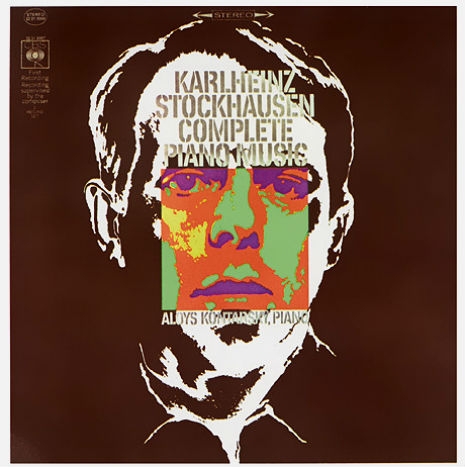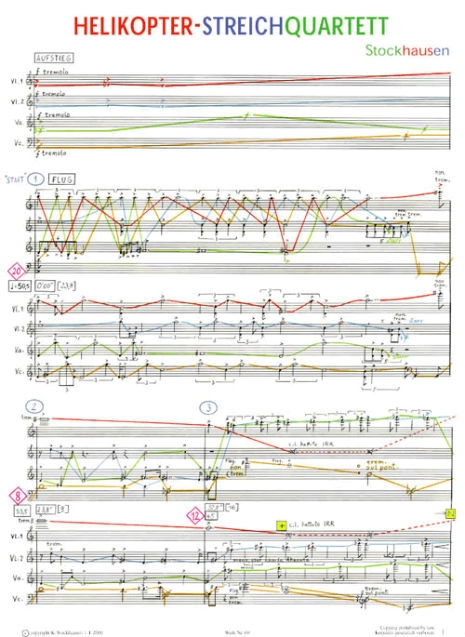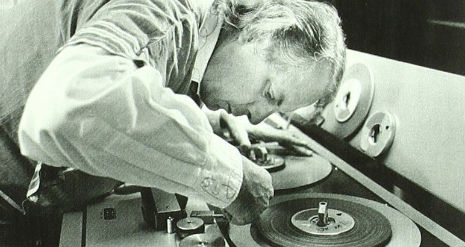
It was a series of dreams that inspired the composer Karlheinz Stockhausen to write his controversial Helikopter-Streichquartett or The Helicopter String Quartet in 1992-93.
Stockhausen had been asked to compose a quartet for Professor Hans Landesmann of the Salzburger Festspiele in early 1991, but the composer had no interest in writing one, that is until he had a dream. Stockhausen was at a party, where the guests snubbed him, were rude to him, whispered behind their hands about him, and he dreamt he could fly away, quite literally:
l don’t have any philosophy, but all my life l’ve dreamt that l can fly, and that l know what it means to fly. ln lots of dreams l leave earth. l often dream that l’m in a cellar, surrounded by people in tuxedos, holding drinks in their hands, and l know l could shut them all up in one go. They don’t want me there.
Then l’m on tiptoes and l let myself go, l just take off and l end up on the ceiling. And then…l swoop down to the floor and fly up again, and everyone says, ‘‘Oh!’‘
l turn elegantly at the wall. l dream that the people are all speechless, watching me—a man, fly.
In another dream, Stockhausen dreamt he was hovering high above four helicopters in which of each four musicians were playing his music. On waking he saw the potential of such a work and made a series of notes and sketches. However, Stockhausen had never written a quartet, as he later explained in a documentary about the Helicopter Quartet:
lt’s the first and probably the last! All my life, l’ve never composed anything for a classical formation.
ln fact, the string quartet is a prototype from the 18th century. Just as the symphony and the solo concerto are the stamp of a very particular era in composition, both as regards interpretation and form. All my life l’ve kept away from that. l haven’t taken up the classical forms.
l’m a pianist but l’ve never written a concerto, and l’ve refused commissions for concerti for violin or piano. The same goes for symphonies and quartets. This quartet is the result of a dream. When the work was commissioned, l said, ‘‘No way, never!’’ Then l dreamt it.
And that’s when everything changed, because l started imagining the four musicians flying, playing in a completely different room. The show is put on for an audience sitting in a concert hall. They imagine the musicians in the air, playing in four flying objects.
ln the future, they could be in flying objects that go up even higher.
This idea was progressed by two further dreams: one in which Stockhausen saw and heard a giant swarm of bees, buzzing, swirling, turning in the sky like a helicopter blade; and a third in which he saw a violinist play music that captured the magical sound of buzzing bees.
Though often performed as a separate piece, the Helicopter Quartet is only one part (“Scene Three”) of Stockhausen’s opera Mittwoch aus Licht or Wednesday from the cycle of seven operas Licht (Light).
Light or “The Seven Days of the Week” consists of 29 hours of music with “neither end nor beginning” that Stockhausen composed between 1977 and 2003.

Stockhausen sent his score for Helicopter Quartet to Professor Landesmann who welcomed it enthusiastically. Of course, Stockhausen has not always been received with such all-embracing support—many considered him to be the P. T. Barnum of classical music, eschewing content for showmanship. One can imagine the sharp intake of breath from some when reading of the requirement list for Stockhausen’s airborne quartet:
4 helicopters with pilots and 4 sound technicians
4 television transmitters, 4 x 3 sound transmitters
auditorium with 4 columns of televisions and
4 columns of loudspeakers
sound projectionist with mixing console / moderator (ad lib.)
Of course, Stockhausen was used to the criticism (perhaps the most famous line coming form conductor Sir Henry Beecham who when asked if he had heard any Stockhausen, replied “No, but I believe I have trodden in some”), and he showed it the disdain it deserved. These “negative critics” were part of that group he had once described, at a lecture on electronic music in 1972, as those who would fail to evolve as humans. Stockhausen believed that not everyone is equal and that his music would only help some people evolve to the next stage—whatever that may be.

The composer at work on the ‘Helicopter String Quartet’.
Stockhausen is described as one of the most important and influential composers of the twentieth and twenty-first centuries, who casts a long shadow over composers like Harrison Birtwistle and Jean-Claude Éloy; jazz musicians such as Charles Mingus, Herbie Hancock and Miles Davis—who cited his influence on the album On the Corner and later recorded with him on an (as yet) unreleased track in 1980; to The Beatles to Frank Zappa to Krautrock and beyond—Roger Waters, Björk, Kraftwerk and Can—whose members Irmin Schmidt and Holger Czukay both studied under him at the conservatory.
And this is before we get to his influence on novelists Philip K. Dick and Thomas Pynchon.
The Helicopter Quartet is one of Stockhausen’s most outrageous and incredible works, performed by four musicians, one in each of the four helicopters, who keep in sync with each other by monitors. The whole piece last 30-minutes with the helicopters hovering in the sky—the sound of the rotor blades adding to the music—as a long series of string tremolos (based on complicated formulae set forth by Stockhausen) are played over and over, in relation to the quartet’s three themes of Michael, Eve and Lucifer.
Surprisingly, the complete opera Mittwoch aus Licht was not performed in its entirety until 2012, when the English Birmingham Opera Company gave the opera its world premiere. This is the complete Helicopter String Quartet as performed by the Birmingham Opera Company on August 22nd, 2012.
A German documentary was made in 1995 about the preparation, performance and recording of and Stockhausen’s Helicopter Quartet. This film can be seen below, though you’ll have to click through to YouTube in order to turn on the English captions.





